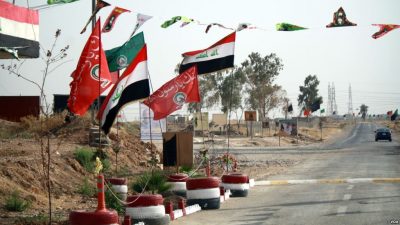Kirkuk, a Counterfeit Prize

The Iraqi government has every right to assert control over Kirkuk. The city had never been a Kurdish center and only after it repulsed threats by ISIS three years ago, did Peshmerga replace Iraqi government forces in the area. Peshmerga has been a coddled and abetted military presence in the US-UK-Israel plan to divide Iraq. (No Kurdish force has had any legitimate presence there.) So recent references by both National Public Radio and BBC news hosts about Peshmerga fighters representing Kurdish sovereignty in Kirkuk are misleading at best.
No one yet knows what the outcome will be of Baghdad’s belated move to affirm authority in the area with its surprising military victory in and around Kirkuk earlier this month. Interested foreign parties from Turkey to Israel have remained silent, thus far. Meanwhile Kurdish spokespeople are making alarming claims in the international press about the deployment, even suggesting those Iraqi forces are ISIS-linked, also invoking the trope of Shia militants taking over their (sic) city, assertions left unchallenged by an acquiescent NPR and BBC.
Why is there so little willingness by US and British media to acknowledge the character and legal status of Kirkuk in Iraq? One hears no reference to the strategic transformation of the city and its environs by nationalist-secessionist Kurdish interests from a majority Turkmen community to a Kurdish one starting in 1991 when the US and UK helped establish an inchoate Kurdish sovereign state in northern Iraq?
The day of the Kurdish referendum in September I noted the process by which Iraqi Kurdish leaders worked to convert Kirkuk into a Kurdish city, with the intention of annexing it when the time came (last month) for their claim of independence, and ignoring the Iraqi constitutionally defined border outside Kirkuk and nearby areas.
It is mystifying why the Turkmen of Iraq, a fiercely Iraqi nationalist, significant minority, has been so invisible in international press coverage of the region. This while they embody a remarkable ideal that opposes any military action. Visiting Kirkuk on two occasions before American forces invaded Iraq in 2003, I saw the displacement of Turkmen families (begun in 1991) in progress and I’ve followed their growing fear of Kurdish dominance, all without threat of armed retaliation. Their population is not small—at least three million– and many Turkmen are well placed in Iraq’s government. Although that proved insufficient to thwart Kurdish ambitions over Kirkuk.
Turkmen’s marginalization in their heartland has won little sympathy outside; their identity and ethnic rights are completely overshadowed by Kurdish separatists and their foreign partners and lackeys, such as Peter Galbraith. Are we to accept comments by BBC guest Nadhim Zahawi as a fair assessment (BBC World News 10.17.17)? Zahawi is a British-Kurdish millionaire, a UK member of parliament, also director of Gulf Keystone Petroleum GKP operating in Iraqi Kurdistan; he moreover chairs the All Party Parliamentary Group for Kurdistan. This in addition to his many controversial legal involvements.
The wider public, it seems, is only permitted to know that Kirkuk sits on major oil deposits. (Of course that explains it being coveted by the Kurds in alliance with the West.) But what about the longtime Turkmen character and history of the city? What about the sustained opposition by Turkmen Iraqis and the Baghdad government to surreptitious tactics by the Kurds, to make it appear the city and surrounding areas is Kurdish and lies within the three Kurdish-dominated governates (Erbil—a once Turkmen-majority city for 700 years, Sulaimania and Duhok) that have enjoyed considerable autonomy since 1991. Kirkuk is no more a part of Kurdish Iraq than nearby Mosul is, and Kurdish rights to Kirkuk has never been part of the semi-autonomous understanding between Iraqi Kurds and Baghdad.
Barbara Nimri Aziz is a New York based anthropologist and journalist. Find her work at www.RadioTahrir.org. She was a longtime producer at Pacifica-WBAI Radio in NY, also author of Swimming Up The Tigris, Real Life Encounters with Iraq, (University Press of Florida, 2007), based on her many years of work in Iraq.
Featured image is from VOA News.


